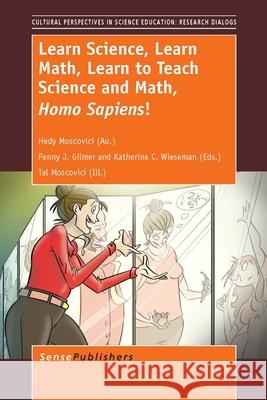Learn Science, Learn Math, Learn to Teach Science and Math, Homo Sapiens! » książka
Learn Science, Learn Math, Learn to Teach Science and Math, Homo Sapiens!
ISBN-13: 9789462091542 / Angielski / Twarda / 2013 / 154 str.
Learn Science, Learn Math, Learn to Teach Science and Math, Homo Sapiens!
ISBN-13: 9789462091542 / Angielski / Twarda / 2013 / 154 str.
(netto: 420,89 VAT: 5%)
Najniższa cena z 30 dni: 423,64
ok. 22 dni roboczych.
Darmowa dostawa!
Dr. Hedy Moscovici's life on three continents and her battle with ovarian cancer shaped the unique co-learning and participative leadership perspective on science and mathematics education shared in this book. This text has multiple audiences - prospective and practicing teachers wanting to motivate their students to learn, science and mathematics educators mentoring teachers to become transformative intellectuals and critical pedagogues, parents interested in their children's advancement, and interested policymakers and public wishing to deepen their understanding about learning in general and educational issues in science and mathematics. Two mottos, "I can't learn from you if you can't learn from me" and "to teach is to learn twice," summarize the essence of her message. The spotlight is on the critical interdependence of factors, specifically human ability to construct understanding; necessity of disequilibrium to spark neural rewiring; cognition-emotion (pleasure vs. pain, even science or math phobia) connections; sociocultural context; dilemma created by the absence of a clearly trustworthy "learning meter" for a society valuing objective measurement of quality of learning; human relationships sustained by three R's (rights, responsibilities, respect); and, heightened awareness of power relationships leading to a spirit of collaboration, recognition of each individual's strengths and expertise; and critical pedagogy.
Dr. Hedy Moscovicis life on three continents and her battle with ovarian cancer shaped the unique co-learning and participative leadership perspective on science and mathematics education shared in this book. This text has multiple audiences - prospective and practicing teachers wanting to motivate their students to learn, science and mathematics educators mentoring teachers to become transformative intellectuals and critical pedagogues, parents interested in their childrens advancement, and interested policymakers and public wishing to deepen their understanding about learning in general and educational issues in science and mathematics. Two mottos, "I cant learn from you if you cant learn from me" and "to teach is to learn twice," summarize the essence of her message. The spotlight is on the critical interdependence of factors, specifically human ability to construct understanding; necessity of disequilibrium to spark neural rewiring; cognition-emotion (pleasure vs. pain, even science or math phobia) connections; sociocultural context; dilemma created by the absence of a clearly trustworthy "learning meter" for a society valuing objective measurement of quality of learning; human relationships sustained by three Rs (rights, responsibilities, respect); and, heightened awareness of power relationships leading to a spirit of collaboration, recognition of each individuals strengths and expertise; and critical pedagogy.











